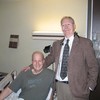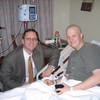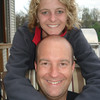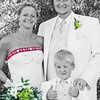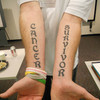Greg Cantwell
My name is Greg Cantwell. I was born in Dusseldorf, Germany where I lived for the first 12 years of my life, then moved to the States. My family moved around for a few years, and then settled down in Potomac, Maryland, where I went to high school. After high school, I moved to Colorado to attend college. It was there I landed the job I had been dreaming about since I was a young boy: working in the airline industry.
I was 30 years old living in Hawaii with no health issues when I was diagnosed with cancer. I was strong, and in good mental and physical condition. On October 28, 2004, my plane had just arrived in Minneapolis, where I would begin my new job with Northwest airlines. I checked into my hotel, went out to eat, and went to bed for what I thought would be a good night sleep.
At approximately 11:15pm, I awoke, experiencing a grand mal seizure. I couldn't talk, was barely able to breathe, and was conscious, but very confused. I was rushed to the emergency room. The doctors asked me all sorts of questions. The questions were easy and I knew I knew the answers, but I could not come up with them. I was scared. Why could I not answer these easy questions, but everyone else could? I was given a CT scan and an MRI. Then they said the doctor was calling in a neurologist. I thought to myself, “Why? This can't be that serious, or can it?”
The neurologist finally arrived and delivered the news no one wants to hear. "Greg, you have a brain tumor." Two days later I returned for a biopsy of the tumor. A few days after that, the results were in: it was a Stage IV Glioblastoma. I could tell from the neurologist’s eyes and tone of voice that the chances I would survive were extremely slim. I thought to myself, “Did I hear him right? I have a brain tumor? Why me?”
That was the only time I ever felt sorry for myself. From that point on I was positive, and knew I was going to beat this cancer no matter what the statistics or doctors said. My son Joseph was one year old at the time. I thought to myself, “I have to be here for him. I want to see him go to school on his first day, play sports, have his first girlfriend, graduate from high school, get married, etc. I have to be here for all that. I am not going to die!” I buckled down for the fight of my life.
I met with my oncologist, who explained I had a 5% chance of surviving one year. He gave me three options for treatment.
1. Have surgery, but do nothing to aggressively fight the cancer and enjoy the limited time I had left with minimal medical intervention.
2. Have surgery, do minimal radiation and chemotherapy to hopefully extend my life a year or two.
3. Have surgery and go all out to fight this cancer with everything that medicine had to offer. This option would make me the sickest and would require many different treatments, but would hopefully give me the best chance of long-term survival.
Given this information, I had a lot to think about. On the positive side, I was strong both mentally and physically, and had the will to want to beat this. I decided that I would take option three, and was scheduled for surgery two weeks later.
I was scared. I had never had any type of surgery before and now I was having a craniotomy. I had no clue what to expect. What would it feel like falling asleep? Would I have complications during surgery? How would I feel when I wake up? Would I remember anything? All these questions and uncertainties!
The big day finally arrived. I was scared and had tears in my eyes. My parents and friends said that they would see me when I got out of surgery, and I was wheeled down the hallway. I don’t even remember getting to the operating room. I was told afterward that the neurosurgeon told my family and friends that he didn't know what to expect; would I be able to talk, feed myself, or even walk?
The first person I confided in was God. I prayed that he would give me the strength to beat this diagnosis. I was just starting a new job and had to tell them that I wouldn’t be able to work for at least a year. They were supportive, and promised to keep my position open for me. They told me to just focus on my health. I told my family and friends about my diagnosis, and I immediately received support. My family took turns flying in to help out. My brother Chris uprooted his from Alexandria, VA and moved them to the Minneapolis area to be there for me. My friend Jeff was always a support system, and continues to be there for me when I need him.
I began the road to Winning The Fight Of My Life. I completed the six weeks of radiation in conjunction with oral Temodar. During my surgery, my neurosurgeon was proactive and inserted five Gliadel Wafers into the resected tumor site. These wafers were the size of a dime and are designed to provide direct chemotherapy to the site and dissolve over a two and a half week period. After a four-week rest period, I began an intense cocktail of chemotherapy, which was administered inpatient over a three-day period. The cocktail consisted of Cytoxin, Etoposide, and Intra Arterial Carboplatin. This treatment would be once a month for a twelve-month period, finishing in February 2006. Since then, I have had routine MRI’s every three months, and have had no recurrence. In 2014, I decided to do my MRI’s every 4 months. This would be the longest that I would consider going in-between MRI’s, knowing what this beast has the potential to do.
To my surprise, I made it through the treatments with very little side effects. I didn’t lose any weight and I never lost my appetite (which I initially attributed to the steroids during the first month of radiation.) However, I did lose my hair, which to this day I keep short. I guess you could say the look grew on me.
I went back to work fulltime in 2006 and kept working until 2008, when I had a seizure driving home from work. I immediately went in for an MRI. It showed no new tumor growth, and my anti-seizure medications were increased. Since my career for the past 15 years has been in an airline management role, which required me to drive on a daily basis, I was forced to resign my position.
In March of 2008, I met Lisa. Like myself, she understood what living with a terminal illness is like. She has Cystic Fibrosis, diabetes, and has had a liver transplant. We have a unique bond, and take care of each other in addition to taking care of our 12 year old son, Joseph. We dated for a little over a year, and were married in June of 2009. Lisa, her family, and friends have been so accepting of myself, my condition, and most of all, my son Joseph. I truly couldn’t ask for anything more. I am blessed to know each one of you.
Losing my job was a blessing in disguise. It gave me the opportunity to volunteer at cancer agencies throughout the United States, providing one-on-one brain cancer support. I even started my own website to provide help to those newly diagnosed, their families, and their caregivers. I have had over 35,000 hits on my site, and have been able to provide support through email, Skype, phone, and in-person to people from all over the world. I also travel throughout the country and share my “cancer survivor-turned-caregiver” experience with various audiences.
As I think back over the years prior to my diagnosis, I remember having migraines, which started in high school. They would only happen 2 or 3 times a year, but were very severe. I could tell they were coming on because my tongue would go numb, then my fingertips, then all the way up my arms. My sight would go blurry and then light would affect me. In order to feel better I would take a hot bath, but then I would get seasick and begin vomiting. I went to the doctor many times; never once did he bring up an MRI. Knowing what I know now, I would definitely advocate for myself and get an MRI.
It has been 12 years since my diagnosis. My scans have showed no new tumor activity. I have dedicated my life to helping and educating those going through a similar diagnosis, as well as their families and caregivers. There is so much that a person like myself can do to help. I volunteer at a number of cancer organizations and hospitals, such as: MD Anderson, Cleveland Clinic, Taussig Cancer Center, The Children’s Brain Tumor Foundation, National Brain Tumor Society, and Imerman Angels. I started my own website 8 years ago www.survivorandcaregiver.com which has now become a 501c3 non-profit called Greg’s Misson www.gregsmission.org. I invite you all to take a look at it and forward it on to anyone you know. To date, I have helped over 1634 people. No one should be alone!

